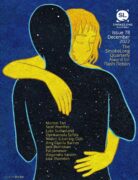I save his visits for the last of the day so they can run overtime. The workers cheer when they see me because he doesn’t love everyone and sometimes swears at them and tries to stab their hands with a butter knife.
Are you my gal? he says, looking at me like I’m Miss America.
No, I’m your nurse, and I place my stethoscope on his chest to show him, wrap the blood pressure cuff around his thin arm.
He nods and says he is too old for me anyway. Then he sees me again. Are you my gal?
We color pictures with crayons at the table for Christmas, a lady in a wheelchair drooling next to us. He covers his mouth with his hand as he leans over and whispers, Look at her, she belongs in a nursing home.
*
The first time I meet him he is lying in bed staring at a wall. He doesn’t respond to his name, blue eyes glassy and streaked with goo. So I play Johnny Cash’s “Ring of Fire,” holding my phone to his ear because he would have been in his 40s in the 60s so he must know it, I think.
When the trumpets blare, his eyes transform, returning to the room with the curtain divider and the cheap wooden dresser. The window with the fields and snow outside.
*
I’m going to see Jesus, he tells me once his lung sounds and wound diameters are recorded. But he is worried, he says, that his family will not want him there.
Everyone is welcome in Heaven, I answer, and we imagine a big tree with his parents underneath calling his name when he arrives and jumping up to greet him.
I don’t know, he says, examining his gnarled hands. I don’t know.
I imagine him young, wearing a red flannel shirt with blue jeans held up by a leather belt, like my boyfriends wore in high school, like my father wore when he took us all for a hike out behind the house. He is walking down Main Street in the town just down the road, shoppers in and out of the hardware store, diner filled with locals bumping into each other on their way to booths. He settles in for a beer at the bar, his buddies tossing darts a few feet away. He takes me for a drive in his red truck, the one he is always so worried about. We go line dancing.
Or he beat her. The wife in the next wing who screams whenever she sees him. Who forgets he lives here and they leave it that way. Takes off the leather belt and hits her with it over and over.
*
This is an in-between place, he says to me from his wheelchair one afternoon when he knows his name.
He gestures at the other wheelchairs pointed toward the TV, the card table, the windows, rolled in all directions like billiard balls after a break. We’re not living or dead in here, he says.
I spend my days helping other people die until it’s his turn and we sit by the window. I tell my husband I fell in love with my patient. Or is it just the mystery of him I love? My husband smiles.
*
Do you want to come? he asks one day as we sit by the window. We’ll be birds and fly over that field and the river.
I have a family, I remind him. I’m a mother, I have to stay. Yes, he nods remembering, I’m too old for you anyway.
They bury him in a little graveyard in a sea of soybeans. My GPS says it will take me there but doesn’t, so I stop at a farmhouse and ask for directions.
You kin to him? the man frowns. I was his nurse, I answer, remembering the swearing and the butter knives. The wife.
They put him in a box with red flowers on top and a handful of real kin around. The lid is massive with hinges huge and silver in the cold. I can’t reach him to put cream on his arms or bandage them, to bring him a Mountain Dew or choose a tune for us to hum along with.
There is not a tree in sight. Wind whips up the roof of the canvas tent we all huddle under, pushing it taut.
The chaplain reads from the Bible. They lower the box into the ground with thick metal chains as I watch birds rise up from the fields in twos and threes.



 The SmokeLong Grand Micro Contest (The Mikey) is now an annual competition celebrating and compensating the best micro fiction and nonfiction online.
The SmokeLong Grand Micro Contest (The Mikey) is now an annual competition celebrating and compensating the best micro fiction and nonfiction online.